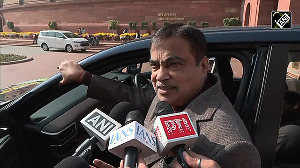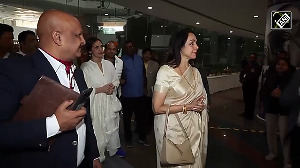'This is a US-India effort and it is not necessarily to counterweight anyone.'
Aziz Haniffa/Rediff.com reports from Washingtonm DC.
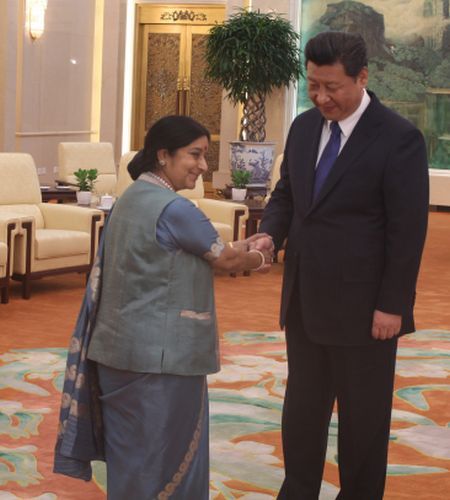 America's embrace of India, as evidenced during President Barack Obama's trip to India last month and his summit with Prime Minister Narendra Modi, does not make New Delhi a counterweight against Beijing, the White House has made clear.
America's embrace of India, as evidenced during President Barack Obama's trip to India last month and his summit with Prime Minister Narendra Modi, does not make New Delhi a counterweight against Beijing, the White House has made clear.
Phil Reiner, Senior Director for South Asian Affairs at the National Security Council at the White House, who traveled with Obama to India, asserted, "This is a US-India effort and it is not necessarily to counterweight anyone."
"I don't think either the US or India has an interest in any kind of confrontation or much less any sort of intent to contain China," Reiner said. "That is not the intent."
Image: Chinese President Xi Jinping broke protocol to meet External Affairs Minister Sushma Swaraj on her visit to Beijing, February 2, 2015. Photograph: MEA/Flickr
"The intent here is to work together, and I think we have, as was noted throughout this visit, both in the private engagements during the bilaterals but also in the public statements at the business summit, to work off of the core values that we have to build India up," he said.
"And this is something that we are very much interested in doing," Reiner noted, "and it is in both of our interests to do so. I would not necessarily put that forward, though, as a counterweight to China per se."
"We are both very much interested in working off of those fundamental values and establishing systems that basically work off of established rules and norms in the international sphere to avoid conflict, to avoid any situation where there may be perceived bullying. That is the attempt."
Reiner dismissed a New York Times report which said the first issue Obama and Modi had discussed during their summit was China's alleged hegemony in the region.
"The notion that the very first thing we would talk about as we come in the door is China is just... I mean, there was many things that we spoke about," Reiner said.
"Coming in the door, I think the primary thing that was talked about was the fact that we had just reached agreement on these two seminal documents -- on the Delhi declaration and on the joint strategic vision. And these are frameworks for an immense amount of work that we are going to undertake going forward."
"We were talking about the region. And of course, China is an element of that discussion," Reiner said.
Both leaders, he added, had "a robust conversation about everything that we have talked about so far that is in the joint strategic vision in terms of making sure that as we engage in the region and as countries grow and continue to expand their economic domain, that this is done within the rules and international norms that exist today."
"That is a fundamentally shared understanding between the two of us," Reiner said, "and it is a remarkably similar set of understandings, I think, between both leaders and both countries."
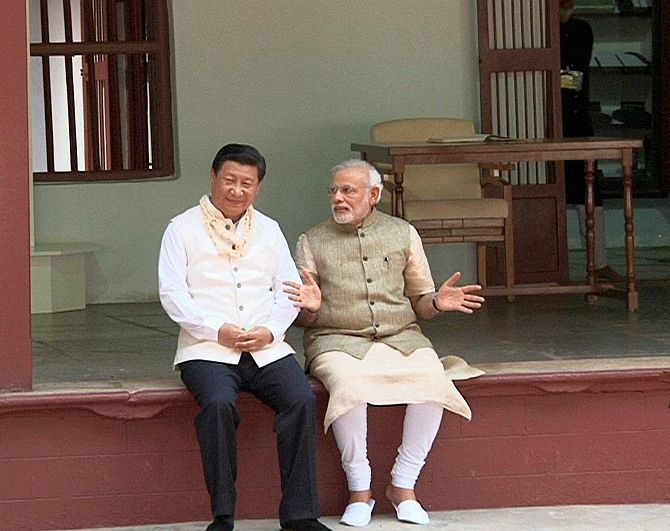 "Within that," he reiterated, "the China conversation is just as important as the full spectrum of conversations that we are having about East Asia and the Indian Ocean writ large and the connectivity that remains there."
"Within that," he reiterated, "the China conversation is just as important as the full spectrum of conversations that we are having about East Asia and the Indian Ocean writ large and the connectivity that remains there."
"There are great opportunities here for all of us to be collaborating together," Reiner said. "And the intent, I think, up front, as you have seen this week, the Indian foreign minister is in Beijing conducting engagement. So this is not intended by any means to be exclusive, or as was noted earlier, to be some sort of counterweight.
Image: Prime Minister Narendra Modi and Chinese President Xi Jinping at Mahatma Gandhi's ashram in Ahmedabad. Photograph: PTI Photo
"But it is intended to find means to make sure that this is a stable and prosperous region going forward, and I think that is the nature of the conversation between the two leaders."
Asked if in the regional context, the Pakistan-India relationship was discussed by both leaders, especially considering the recent tensions between the two countries on the Line of Control, Reiner acknowledged, "The two leaders have maintained a consistent dialogue on the region, and, of course, that includes Pakistan, it includes Afghanistan."
"In September," he recalled, "it was a very positive conversation about the small steps that we may have seen -- so, for instance, for Republic Day (Pakistan Prime Minister) Nawaz Sharif issued a letter to the prime minister (Modi). I think this is one of those small things that we can look to that is necessary in order to create the space for re-engagement on dialogue."
"Prime Minister Modi pointed to the two minutes of silence that they observed in India after the horrific attacks in Peshawar," Reiner added, and noted, "There are a number of smaller steps that are being taken that will create that space so that the two can begin to re-engage."
"And this is something that the United States very much supports, and that is the nature of the discussion between the two leaders, that a dialogue is really something that would be incredibly important between the two countries and that we encourage it," Reiner added.
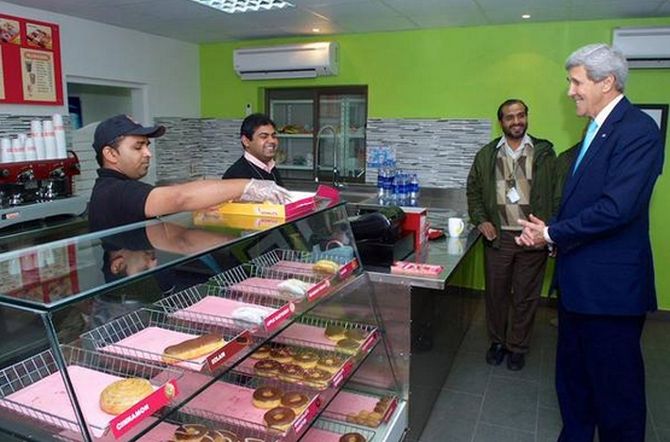
When informed of analyses in the Pakistan media that the US-India nuclear deal would upset the strategic stability in the region and Washington's role in maintaining strategic equilibrium and conflict management between the two countries, Reiner pointed out, "This is an agreement that was actually reached a number of years ago" and what had happened last month in the Obama-Modi summit, "is simply the policy breakthrough that was necessary in order to actually implement what was already an existing agreement."
"So in terms of strategic stability, it is really... a continuation of something that already existed and has not had a negative impact".
Image: US Secretary of State John Kerry at a Dunkin' Donuts in Islamabad, January 13, 2015.
"We have a very positive and increasingly positive relationship with Pakistan on a number of levels," Reiner said, "both in the civilian and economic and development domain as well as the security domain."
"And that does not imperil any efforts that we are undertaking with the Indian government or the Indian people, and vice versa. I think it is something that we can do at the same time."









